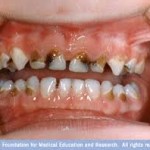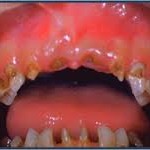When babies are left to sleep sucking on milk or juice bottles, their teeth are prone to developing rampant caries, a syndrome called baby bottle caries. If this happens way before deciduous teeth shed, attempts to restore damaged teeth should be taken into consideration. Infected teeth should be removed, carious teeth should be restored with stainless steel crowns or fillings and missing teeth should be replaced with appliances.
To prevent this from happening, never let your child suck on milk or juice bottles when sleeping. Replace it with a pacifier is a good solution.
Preventing Baby Bottle Tooth Decay
- Try not to share saliva with the baby through common use of feeding spoons or licking pacifiers. After each feeding, wipe your child’s gums with a clean, damp gauze pad or washcloth.
- When your child’s teeth come in, brush them gently with a child-size toothbrush and a smear (or grain of rice sized amount) of fluoride toothpaste until the age of 3.
- Brush the teeth with a pea-sized amount of fluoride toothpaste from the ages of 3 to 6.
- Supervise brushing until your child can be counted on to spit and not swallow toothpaste—usually not before he or she is 6 or 7.
- Place only formula, milk or breastmilk in bottles.Avoid filling the bottle with liquids such as sugar water, juice or soft drinks.
- Infants should finish their bedtime and naptime bottles before going to bed.
- If your child uses a pacifier, provide one that is clean—don’t dip it in sugar or honey.
- Encourage your child to drink from a cup by his/her first birthday.
- Encourage healthy eating habits.
When your child’s first tooth appears, talk to your dentist about scheduling the first dental visit. Treat the first dental visit as you would a well-baby checkup with the child’s physician. Remember: starting early is the key to a lifetime of good dental health.

